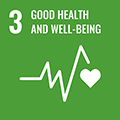ADDRESSING DISPARITIES IN CANCER CARE THROUGH RESEARCH
Queen’s is at the forefront of groundbreaking research aimed at reducing cancer inequalities and improving outcomes for patients across the UK, Europe, and beyond. Through a series of impactful studies and policy-shaping initiatives, Queen’s has highlighted the critical issues of financial discrimination against cancer survivors, the disparities in cancer care exacerbated by conflict, and the importance of cross-border data sharing to enhance cancer outcomes. This research has informed national and international cancer strategies, advocating for more equitable and effective cancer care.
Research Challenge
CONFRONTING INEQUALITIES AND ENHANCING CANCER CARE
Cancer care is marked by significant disparities, ranging from financial discrimination against survivors to the uneven access to treatment caused by socio-political factors, such as conflict. Researchers at Queen’s University have been dedicated to identifying these inequalities, understanding their impact, and proposing evidence-based solutions. The challenges they address include capturing data intelligence on cancer inequalities, easing the financial burdens faced by cancer survivors, overcoming the disruption of cancer care in conflict zones, and the need for improved data sharing across borders to save lives.
Our Approach
PIONEERING STUDIES AND STRATEGIC SOLUTIONS
The European Cancer Pulse: evidencing inequalities to inform better care for all
Together with the European Cancer Organisation, Europe’s largest multi-professional cancer organisation, Queen's researchers have pioneered the European Cancer Pulse, an innovative platform that captures cancer inequalities data, gathering intelligence to inform cancer policy and mitigate the impact of cancer inequalities on cancer outcomes. This empowering tool has been frequently praised and is widely employed across Europe to prompt changes in cancer policy and enhance peoples’ lives.
Financial Discrimination Against Cancer Survivors
A landmark 2024 study led by Queen’s researchers revealed the widespread financial discrimination faced by cancer survivors in Europe, at a stage where their cancer is deemed to be cured. The study, which included detailed analyses of survivor experiences, found that individuals who had overcome cancer often encountered higher insurance premiums and difficulty accessing financial products such as mortgages. This research has brought significant attention to the economic challenges that cancer survivors face, prompting discussions on regulatory reforms to protect them from financial discrimination.
Addressing Cancer Care in Conflict Zones
In response to the disastrous impact of conflict on cancer care, Queen’s University, in collaboration with other like-minded institutions globally, published a manifesto in 2024 that outlines the severe consequences of political and armed conflict on cancer patients. The manifesto, developed by leading researchers at Queen’s, in collaboration with international colleagues details how conflict disrupts the provision of essential cancer services, leading to delayed diagnoses, interrupted treatments, and reduced survival rates. This work underscores the urgent need for international cooperation and targeted interventions to mitigate the effects of conflict on cancer care.
Advocating for Cross-Border Data Sharing
Another significant area of research at Queen’s focuses on the potential benefits of an all-island approach to data sharing between Northern Ireland and the Republic of Ireland. A 2024 study highlighted that greater collaboration and data integration across borders could significantly improve cancer outcomes. By enabling the sharing of patient data, this approach allows for more accurate diagnoses, better treatment planning, and enhanced research capabilities. The findings from this study support the development of a unified cancer care strategy across the island of Ireland, which could serve as a model for other regions facing similar challenges.
Shaping National and International Cancer Strategies
Queen’s research has had a profound impact on shaping cancer strategies at both the national and international levels. The evidence generated by these studies has led the government to reinstate a National Cancer Plan for England, with a focus on addressing cancer inequalities, improving access to care and promoting early diagnosis. Additionally, Queen’s has been instrumental in the European Cancer Pulse , which tracks disparities in cancer outcomes across Europe and guides policy efforts to reduce these inequalities (see above).
Through its comprehensive and impactful research, Queen’s University Belfast is leading the charge globally in addressing cancer inequalities, ensuring that all patients have access to the care and support they need, regardless of their circumstances or where they live.
What impact did it make?
DRIVING POLICY CHANGES AND ENHANCING PATIENT CARE
Influencing National Cancer Policies
The research conducted at Queen’s University has directly influenced national cancer policies, particularly in the UK. The findings on financial discrimination against cancer survivors have spurred policy discussions across Europe aimed at protecting survivors from economic hardships, leading to calls for regulatory changes that would ensure fair access to financial services for cancer survivors.
Mitigating the Impact of Conflict on Cancer Care
The manifesto on the impact of conflict on cancer care has raised global awareness of the issue and encouraged international cooperation to address the unique challenges faced by cancer patients in conflict zones. This research has led to increased advocacy for the protection of healthcare services during conflicts and for the development of contingency plans to ensure that cancer care continues uninterrupted.
Promoting Cross-Border Collaboration
The study advocating for an all-island approach to data sharing, digital health and joint cancer research has laid the groundwork for more effective cancer care being delivered through collaboration between Northern Ireland and the Republic of Ireland. This cross-border initiative has the potential to save lives by enabling more comprehensive cancer care and research, and it serves as a blueprint for other regions to improve cancer outcomes through data integration.
Our impact
Impact related to the UN Sustainable Development Goals
Learn more about Queen’s University’s commitment to nurturing a culture of sustainability and achieving the Sustainable Development Goals (SDGs) through research and education.











